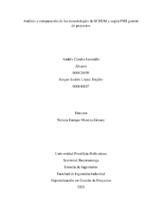| dc.contributor.advisor | Moreno Gómez, Nelson Enrique | |
| dc.contributor.author | Jaramillo Álvarez, Andrés Camilo | |
| dc.contributor.author | López Trujillo, Sergio Andrés | |
| dc.coverage.temporal | 2020 | |
| dc.date.accessioned | 2021-11-03T20:31:38Z | |
| dc.date.available | 2021-11-03T20:31:38Z | |
| dc.date.issued | 2021 | |
| dc.identifier.uri | http://hdl.handle.net/20.500.11912/9610 | |
| dc.description | 84 páginas | spa |
| dc.description.abstract | En esta monografía se identifican inicialmente las principales características y procesos generales de las metodologías de gestión de proyectos según PMI y Scrum, y se analizan las diferentes posturas y conclusiones de autores e investigadores alrededor de la gestión de proyectos, acerca de sus fortalezas, debilidades y riesgos, así como de su pertinencia de aplicación según las características propias de cada proyecto y el entorno en el que se desarrollan. Posteriormente se investiga sobre la posibilidad de gestionar los proyectos con una metodología híbrida que combine elementos del PMI y Scrum, y se explica cómo sería dicha gestión. Finalmente se analizan y discuten de forma crítica los puntos de vista y las conclusiones a las que han llegado los diferentes autores e investigadores, identificando los puntos en común y las discrepancias, para llegar a establecer lineamientos y un criterio que determine la aplicabilidad de cada metodología en distintos proyectos y entornos en los que se llevan a cabo. | spa |
| dc.description.abstract | This monograph identifies the main characteristics and general processes of project management frameworks according to PMI and Scrum, and analyzes the different positions and conclusions of authors and researchers around project management, about their strengths, weaknesses and risks as well as its relevance of application according to the characteristics of each project and the environment in which they are developed. Subsequently, the possibility of managing projects with a hybrid methodology that combines elements of PMI and Scrum is investigated, and it is explained how such management would be. Finally, the points of view and the conclusions reached by the different authors and researchers are critically analyzed and discussed, identifying the common points and the discrepancies, in order to establish a criterion that determines the applicability of each methodology in different projects and environments in which they are carried out. | eng |
| dc.format.mimetype | application/pdf | |
| dc.language.iso | spa | |
| dc.publisher | Universidad Pontificia Bolivariana | spa |
| dc.rights | Attribution-NonCommercial-NoDerivatives 4.0 International | * |
| dc.rights.uri | http://creativecommons.org/licenses/by-nc-nd/4.0/ | * |
| dc.subject | Especialización en Gestión de Proyectos | spa |
| dc.subject | Gestión de proyectos | spa |
| dc.subject | DOFA (Debilidades, Oportunidades, Fortalezas y Amenazas) | spa |
| dc.subject | Híbrida | spa |
| dc.subject | Investigación | spa |
| dc.title | Análisis y comparación de las metodologías de SCRUM y según PMI gestión de proyectos | spa |
| dc.type | Especialización | spa |
| dc.publisher.department | Escuela de Ingenierías | spa |
| dc.publisher.program | Especialización en Gerencia de Proyectos | spa |
| dc.type.hasVersion | publishedVersion | spa |
| dc.description.sectional | Bucaramanga | spa |
| dc.description.degreename | Especialista en Gerencia de Proyectos | spa |


